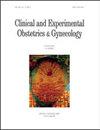The Relationship between Nifedipine and Postpartum Blood Loss in Patients with Preterm Labor
IF 0.6
4区 医学
Q4 OBSTETRICS & GYNECOLOGY
引用次数: 0
Abstract
Background: The purpose of the study, to determine whether exposure to nifedipine before delivery is associated with an increased risk of postpartum blood loss in patients with preterm labor. Methods: This was a retrospective study screening a total of 486 patients who were admitted due to preterm labor from 2012 to 2019. Patients who were given nifedipine for tocolysis before delivery were considered as the study group (n: 240), and the patients who gave birth without getting tocolysis were considered as the control group (n: 246). The dose of nifedipine used during the last 24 hours, 72 hours and 1 week before delivery, the total dose of nifedipine given and the duration from the last dose to the delivery were recorded separately. Hemoglobin and hematocrit and platelet values measured before and 6 hours after delivery were recorded and postpartum bleeding amount was calculated. Results: No significant difference is observed in terms of mean difference between pre/postpartum hemoglobin and hematocrit levels between control group and nifedipine group (p > 0.05). But when subgroups that are created according to the time of use of nifedipine before delivery, a positive correlation was observed between difference in hemoglobin and hematocrit levels between prepartum and postpartum and nifedipine dosage for the last 24 hours (r = 0.176, p = 0.006), (r = 0.139, p = 0.030), but not for 72 hours or one week. Conclusions: The use of nifedipine in patients with preterm labor for tocolysis may be associated with increase in postpartum blood loss in the last 24 hours before delivery.硝苯地平与早产患者产后失血的关系
背景:本研究的目的是确定产前接触硝苯地平是否与早产患者产后失血风险增加有关。方法:对2012 - 2019年因早产入院的486例患者进行回顾性研究。将分娩前给予硝苯地平消产的患者作为研究组(n: 240),未给予消产的患者作为对照组(n: 246)。分别记录分娩前24小时、72小时和1周硝苯地平的用药剂量、硝苯地平总剂量和最后一次给药至分娩的持续时间。记录分娩前及产后6小时血红蛋白、红细胞压积、血小板值,计算产后出血量。结果:对照组和硝苯地平组产前/产后血红蛋白和红细胞压积水平的平均差异无统计学意义(p >0.05)。但根据分娩前硝苯地平使用时间建立亚组时,观察到产前和产后血红蛋白和红细胞压积水平的差异与最后24小时硝苯地平剂量呈正相关(r = 0.176, p = 0.006), (r = 0.139, p = 0.030),但72小时或1周不呈正相关。结论:早产患者使用硝苯地平溶胎可能与分娩前最后24小时的产后出血量增加有关。
本文章由计算机程序翻译,如有差异,请以英文原文为准。
求助全文
约1分钟内获得全文
求助全文
来源期刊
CiteScore
0.50
自引率
0.00%
发文量
241
审稿时长
1 months
期刊介绍:
CEOG is an international, peer-reviewed, open access journal. CEOG covers all aspects of Obstetrics and Gynecology, including obstetrics, prenatal diagnosis, maternal-fetal medicine, perinatology, general gynecology, gynecologic oncology, uro-gynecology, reproductive medicine, infertility, reproductive endocrinology, sexual medicine. All submissions of cutting-edge advances of medical research in the area of women''s health worldwide are encouraged.

 求助内容:
求助内容: 应助结果提醒方式:
应助结果提醒方式:


